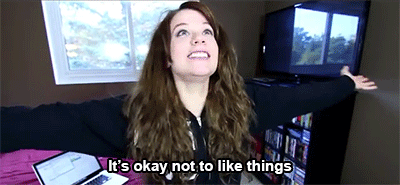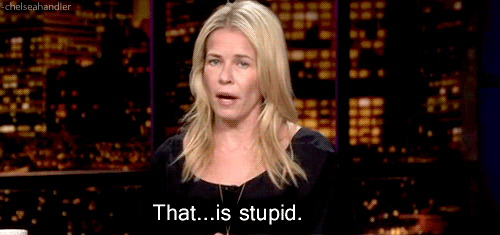I want to begin this post by saying:

Everyone is entitled to deciding how they feel about literally everything. Alright, now here we go.
I HATE CLICHÉS. Clichés (also known as “proverbs“) are all around us, throughout our lives, sometimes even multiple times a day.
The thing about clichés, though, is that they are overused, and lack original thought. To surround oneself with clichés throughout a lifetime only leads to the lack of creative ability and authentic cognitive processes. These clichés, specifically, are called “Trite Pairs”. I always say that one saying is more beneficial than the other, but overall they’re useless in speech.
I hate them, and here’s why:
1. “Absence makes the heart grow fonder” vs. “Out of sight, out of mind”
The first option suggests that when a person is not with a loved one, they tend to miss them even more; however, the second suggests that if a person does not see someone or something enough, or at all, they are easy to forget. How can we, as a people, decide which is the true cliché when the two options contradict each other?
2. “Knowledge is Power” vs. “Ignorance is Bliss”
These two popular sayings are contradictory because the first tells people that knowing things will be positive in their life, but the second says that the less they know, the less they will worry. Neither is true, because you can be a genius with no power, or an idiot with worries. Stupid proverbs.
3. “Nothing ventured, nothing gained” vs. “Better safe than sorry”
This says that if a person does not try, they will not succeed, but also that life is better when a person does not take chances. How would we learn anything, as a people, if we never took any chances? We’d have no light, no computers, and no pizza.
4. “The best things in life are free” vs. “You get what you pay for”
The thought brought forward here say that people don’t have to spend money to have fun or be happy, but also that if a person does not give his money up then he will not receive good things. I believe that money isn’t a necessity for happiness, but I also know that having some makes living life a whole lot easier, so neither is true,
5. “You’re never too old to learn” vs. “You can’t teach an old dog new tricks”
The first explains that knowledge can be gained no matter a person’s age, but the second says that as people get older, they are less able to learn new things. This is ridiculous, because my 87 year old grandmother sent me a text for the first time ever, last week. She recently learned that, and proves this pair wrong.
6. “The early bird gets the worm” vs. “Good things come to those who wait”
This says that arriving or waking early in the morning helps people get what they desire, but also that good things happen to people who are patient. How can people set out to accomplish tasks at an early time, but be unsuccessful because they ventured after their goals instead of waiting for success to come to them?
7. “Too many cooks spoil the broth” vs “Many hands make light work”
The first explains that when too many people try to manage a project or job, they will cause it to turn out poorly, but the second says that when there is an excess of help, each person will not have to work that hard. I think team work is great, but there are also certain tasks that must be completed alone (going to the restroom, taking an exam).
8. “To be is To do” vs. “To do is To be”
A person has to do things in order to be alive, but tasks must be completed in order to be a person. Neither of these makes much sense, so we’ll continue to let Hamlet deal with the whole be and do thing.
9. “Birds of a feather flock together” vs “Opposites attract”
This suggests that people who are similar go to the same places and do the same things, but also that people who are different gravitate toward one another. Why can’t people just hang out with the kind of people they want to, huh?
10. “Don’t judge a book by it’s cover” vs “Clothes make the man”
The first saying means that people shouldn’t make a judgment on a person based only on what can be seen, but also that what a person wears explains who they are. A bunch of nonsense, basically.
You get the idea. These things are ridiculous when you actually put some thought into them. I just really feel that people should know what the words coming out of their mouths mean. Decipher the rest on your own, I know you can do it.

11. “Bide your time” vs. “There is no time like the present”
12. “Silence is golden” vs. “The squeaky wheel gets the oil”
13. “Forgive and forget” vs. “Revenge is a dish best served cold”
14. “Money doesn’t buy happiness” vs. “He who pays the piper calls the tune”
15. “The pen is mightier than the sword” vs. “Actions speak louder than words”
16. “Wise men think alike” vs. “Fools seldom differ”
17. “Look before you leap” vs. “He who hesitates is lost”
18. “Do it well or not at all” vs. “Half a loaf is better than none”
19. “Great starts make great finishes” vs. “It isn’t over until it’s over”
20. “Practice makes perfect” vs. “All work and no play makes for a dull boy”
21. “What’s good for the goose is good for the gander” vs. “One man’s meant is another man’s poison”
22. “Hold fast to the words of your ancestors” vs. “Wise men make proverbs, and fools repeat them”
23. “Don’t put all your eggs in one basket” vs. “In for a penny, in for a pound”
24. “An eye for an eye” vs. “Turn thy cheek”
25. “Do unto others as you would have them do unto you” vs. “Nice guys finish last”
And that is the list of clichés I cannot stand. Be creative and find your own words, because using a cliché will make you sound uneducated.
Good Luck!
Carlie
(Post Source)